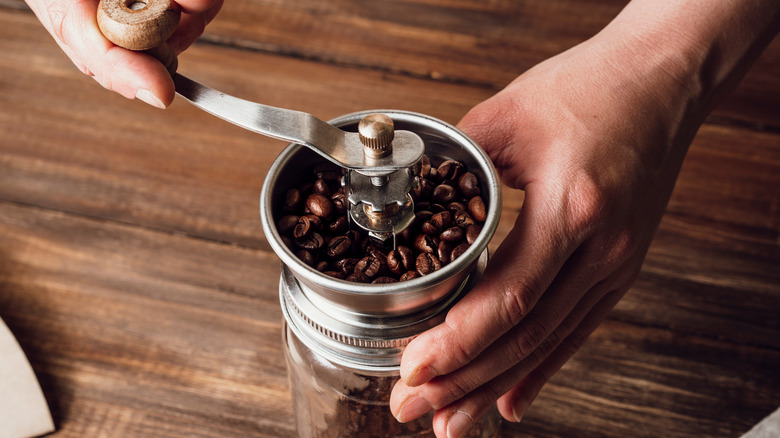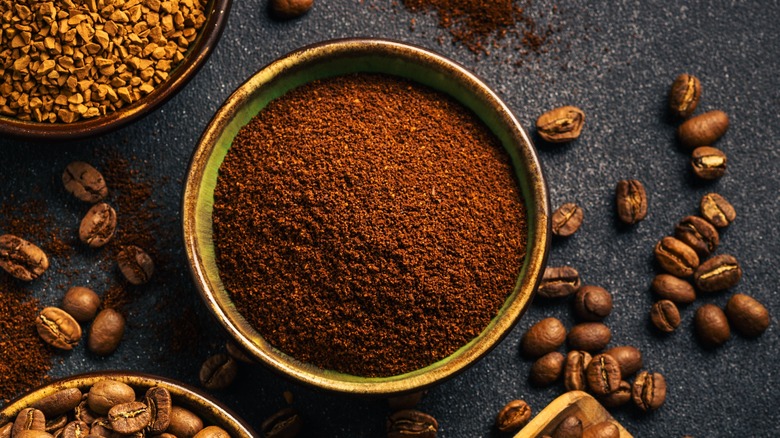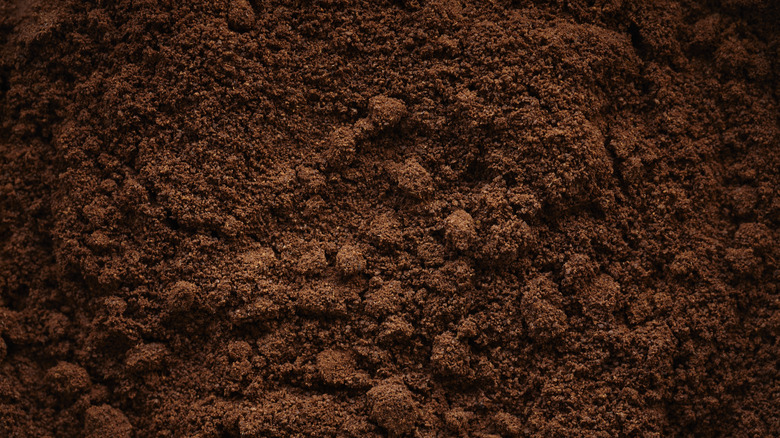The Scientific Reason To Add Water To Coffee Beans Before Grinding
Almost nothing can compare to a fresh cup of joe in the morning. It takes some effort, but when coffee beans are roasted, ground, and brewed properly, the smooth taste and delectable aroma of the finished cup can start off almost any day on the right foot. And, if you're grinding your own coffee at home, there's a way to upgrade the process to get a café-quality drink: add a bit of water to the beans before grinding them.
Coffee beans are known to release static electricity when ground, which can lead to a slew of problems, such as coffee grounds clumping together. This phenomenon makes it harder for water to filter through the ground coffee evenly, leading to a weaker cup that could even have hints of a burnt taste. Luckily, a 2024 study led by researchers at the University of Oregon has found that a little water can help to prevent these issues. Adding some water to the beans humidifies their environment, which hinders the ability of static forming and turning your fine coffee particles into undesirable clumps.
The researchers also found that coffee beans ground with a few drops of water had a more prominent flavor, and brewed a quality cup of coffee a lot more consistently by cutting down on poor extraction. So, if you're having trouble making amazing coffee at home, you should consider giving this method a try.
A few drops of water also prevents messes
Baristas and coffee aficionados have long known of the headaches of static electricity interacting with coffee. It sounds odd, but a considerable amount of static can be generated during the pulverization of beans, as the rapid speed of the grinder combined with the presence of dry air between the beans creates the perfect conditions for electric power to generate.
In addition to causing clumping, the unstable electric charge can cause some of your ground coffee to go airborne and land on surfaces all over your kitchen. Problems with static electricity are made more prominent when you're dealing with drier coffee variants with less water content overall, such as dark roasts, according to a 2023 study published in Matter.
This is yet another reason to add some water to your beans — since it reduces static, it can help keep your countertops clean, making for a much neater coffee grinding experience. However, make sure not to drown your coffee beans in water. Too much could easily result in clumping, which defeats the purpose of the trick, and if you leave your coffee sitting in too much water, it can even cause molding. A short spritz with a spray bottle or a light graze with a wet finger should be more than enough to keep clumps of coffee out of your cup and your kitchen.
Use the water hack for fine-grain coffee
Even with the water trick helping you out, you may think that grinding your coffee is too much work. However, you should consider trying it, even without a grinder, for a few good reasons. Firstly, freshly-ground coffee is obviously fresher-tasting than pre-ground. Secondly, since you'll have complete control over how to grind your beans and for how long, you can switch up the size of your coffee grains to match your preferred brewing method, and maximize the amount of flavor you extract when the coffee is brewed. Coffee made via cold brew or French press benefits the most from chunky, coarse grinds, as the large grains are able to withstand the lengthy submersion in water without releasing bitter or weak flavors.
It's notable that coarsely grinding coffee beans does not accumulate as much static as finely pulverizing them, so you might even be able to skip out on adding water if you grind your beans roughly. Espressos and Turkish coffees are another story. These coffee variants require a powdery finish because the brewing methods only expose the grinds to hot water for mere seconds, so finely grinding the beans is a must-do. Remember to use the water trick if you're making your own espressos, lattes, or cappuccinos at home.



